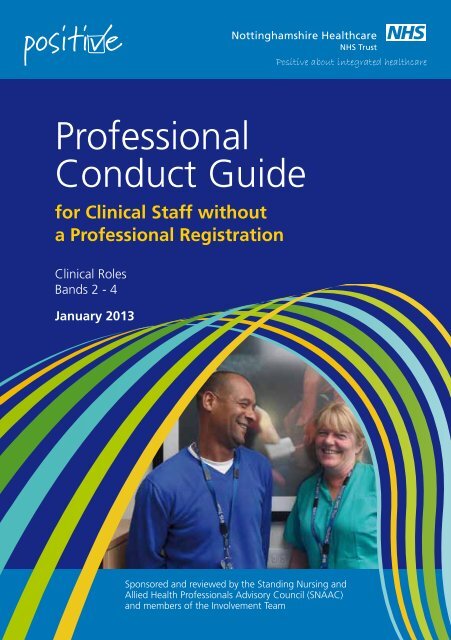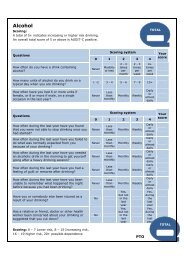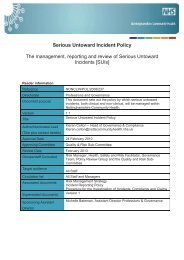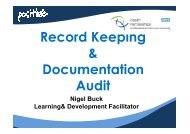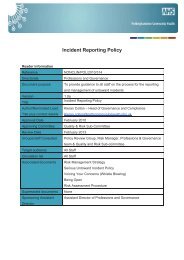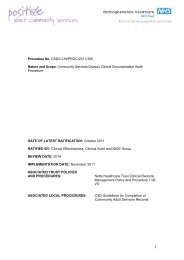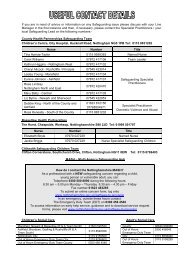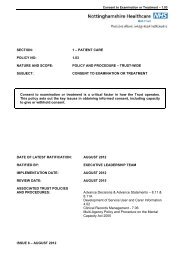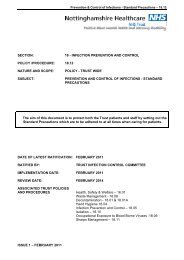Professional Conduct Guide - Health Partnerships Learning ...
Professional Conduct Guide - Health Partnerships Learning ...
Professional Conduct Guide - Health Partnerships Learning ...
You also want an ePaper? Increase the reach of your titles
YUMPU automatically turns print PDFs into web optimized ePapers that Google loves.
<strong>Professional</strong><strong>Conduct</strong> <strong>Guide</strong>for Clinical Staff withouta <strong>Professional</strong> RegistrationClinical RolesBands 2 - 4January 2013Sponsored and reviewed by the Standing Nursing andAllied <strong>Health</strong> <strong>Professional</strong>s Advisory Council (SNAAC)and members of the Involvement Team
<strong>Professional</strong> <strong>Conduct</strong> <strong>Guide</strong>3IntroductionNottinghamshire <strong>Health</strong>care is a leading employer of nonregisteredclinical staff in a variety of healthcare locations acrossNottinghamshire, Leicestershire and South Yorkshire.This document sets out a <strong>Professional</strong> <strong>Conduct</strong> <strong>Guide</strong> withsupporting standards for all band 2 – 4* clinical staff employedby Nottinghamshire <strong>Health</strong>care. This guidance is designed for allclinical staff without a professional registration; regardless of jobtitle, place of work or duties undertaken.This guide is a two way process. It sets out expectations of youand your accountabilities, but also identifies what you can expectas an employee of the Trust. This includes access to induction,learning and development opportunities, annual appraisal andregular support and supervision.The information has been reviewed via formal consultation withNottinghamshire <strong>Health</strong>care’s Standing Nursing and Allied <strong>Health</strong><strong>Professional</strong>s Advisory Council (SNAAC).*Includes higher banded clinical staff without a professional registrationDean HowellsExecutive Director: Nursing, Quality and Patient Experience2January 2013
<strong>Professional</strong> <strong>Conduct</strong> <strong>Guide</strong>5Background and ContextThe diverse roles of our band 2 – 4 clinicians have an enormous impacton the quality of healthcare for people who use the Trust’s services. It isessential to offer the highest quality of care at all times and to protectservice users, patients and the public from harm.The non-registered clinical roles playa vital part in ensuring that the Trustdelivers its services in a way that is safeand promotes respect, privacy anddignity as core to its everyday business.As a band 2 – 4 non-registeredclinician, you are an essential sourceof information for the wider multiprofessional team due to your closeand regular contact with patientsand service users. Furthermore, thisincreased contact provides you withthe opportunity to directly influencethe wellbeing and behaviour of allwho have contact with our services,by providing a positive role modeland demonstrating positive socialinteractions.As an employee of Nottinghamshire<strong>Health</strong>care you are expected tomaintain a certain standard of work,in terms of being able to do your jobproperly, acting appropriately anddoing the right thing at the right time.This includes ensuring you maintainstandards of dress and behaviourwhenever working in the Trust orrepresenting the Trust on work relatedbusiness.All professionally registered membersof the clinical team are accountable toprofessional bodies for ensuring thatany duties or tasks they delegate areundertaken by a competent personand to a reasonable standard. Withinthis context, you must also ensure thatyou are aware of your own levels ofexpected competency within your jobrole and are accountable for your ownactions and duties.In other words, you are accountableand must be able to answer for yourown actions, mistakes and omissions.The Principles of <strong>Professional</strong> <strong>Conduct</strong>(The 6 ‘C’ Model)Throughout 2013 and beyond you will hear about six words that beginwith the letter C. These six ‘C’s stand for Communication, Compassion,Courage, Competency, Commitment, Care Quality/Safety. They are wordsthat describe how care in the NHS should be provided and how you as anemployee of Nottinghamshire <strong>Health</strong>care are expected to work.This <strong>Professional</strong> <strong>Conduct</strong> <strong>Guide</strong> consists of a list of principles with supportingstatements that set out the standards for how all clinical band 2 – 4 staff shouldwork on a day-to-day basis. This guide is equivalent to a professional code ofconduct and reflects what is required of all regulated healthcare professionalgroups, such as nurses, doctors, allied health professionals and social workers, andis based on the underlying principle of public protection.The Nursing and Midwifery Council (NMC), the <strong>Health</strong> and Care ProfessionsCouncil (HCPC), the General Pharmaceutical Council (GPhC) and the GeneralDental Council (GDC) have a code of conduct for the professions they represent,that each individual professional must adhere to.The principles in this guide are based on these professional standards withappropriate adaptation for Nottinghamshire <strong>Health</strong>care’s non-registeredworkforce.This <strong>Professional</strong> <strong>Conduct</strong> <strong>Guide</strong> is underpinned by the philosophythat all patients, service users and their families must be able totrust you with their health and wellbeing. You should always referto senior clinical colleagues, professionally registered staff and thewider multi-professional clinical team whenever you are uncertainof your actions or ability.4January 2013
<strong>Professional</strong> <strong>Conduct</strong> <strong>Guide</strong>7Principle OneMake the care of people your first priorityTo achieve this you should work to thefollowing standards:1.1 Treat people as individuals by:• respecting people’s dignity• not discriminating in any way againstpatients, service users or their families• treating people kindly, consideratelyand sensitively• acting as an advocate for those inyour care and helping them accessrelevant information and support• promoting and protecting theinterests of the patient or service user1.2 Respect people’sconfidentiality by:• understanding a person’s right toconfidentiality• understanding how and whyinformation is shared• supporting the clinical team inhelping service users and theirfamilies understand why and howinformation is shared• understanding and supporting theright of patients or service users toaccess their records• not accessing or reading patientnotes or records unless there is aclear, clinical need• not breaching confidentialityinformally, for example when out inpublic and talking about workrelated topics• making no mention of clinical work,clinical conversations and patientbased conversations on socialnetworking sites1.3 Ensure that you have patientconsent by:• ensuring your patient is fully aware ofyour professional role• being aware (if relevant to yourservice) of legislation and codes ofpractice, for example The Mental<strong>Health</strong> Act, The Children’s Act,Mental Capacity Act by attendingrelevant training, and the implicationsthat this has for you as a nonregisteredclinician and as a memberof the general public• respecting and supporting a person’sright to accept or decline care wherelegally appropriate• ensuring that you have a person’sinformed consent to provide care andto have this documented• upholding a person’s right to be fullyinvolved in decisions about their care• being able to demonstrate that youhave acted in someone’s best interests1.4 Collaborate with patientsand service users by:• understanding and contributing tocare planning in collaboration withthe patient or service user• participating in the delivery of care aspart of the care team• listening and responding to theconcerns and preferences of serviceusers• having (if working in a mentalhealth or learning disability service)an understanding of the recoveryapproach and process, promoting aservice user’s recovery by focusingupon their strengths and abilities• respecting and supporting the abilityof people to care for themselves• recognising and working withother healthcare professionals tomeet a person’s language andcommunication needs• understanding and respecting aperson’s cultural, religious andspiritual needs1.5 Maintain clear professionalboundaries by:• not asking for or accepting any loans,gifts, favours or hospitality• respecting work colleagues• establishing and maintainingprofessional and/or therapeuticrelationships with patients serviceusers, their families and carers• having only professional contactwith your patients, service users ortheir families outside work. Wherecontact is unavoidable, (for exampleif you live in the same communityas your patients) a high level ofprofessionalism is maintained and theissue taken into supervision• disclosing information appropriatelyif you believe somebody maybe at risk of any typeof harm6 January 2013
<strong>Professional</strong> <strong>Conduct</strong> <strong>Guide</strong>Principle TwoTo achieve this you should work to thefollowing standards:2.1 Share information withyour colleagues by:• being part of a care team, andlistening, responding and feedingback information regarding your rolein a person’s care• keeping colleagues aware of yourobservations, interventions andinteractions with people you care for• working with colleagues to monitorthe quality of your work andmaintaining the safety of those youcare for• participating in clinical supervision2.2 Work effectively as partof a team by:• respecting the skills, expertise andcontributions of your colleagues• working collaboratively and cooperativelywithin the team• delegating and supervising othernon-registered colleagues and othercare-givers effectively (if this is part ofyour role) ensuring that instructionsgiven to others are understoodand able to be carried outWork with others to protect and promote thehealth and wellbeing of patients, service users,their families, carers and the wider community• sharing your skills and experiencewith the team• recognising and being aware of yourabilities and limitations, and beinghonest about what you can andcan’t do• consulting, taking advice andbeing supervised by colleagues asappropriate• treating your colleagues fairly andwithout discrimination2.3 Manage risk by immediately:• acting without delay if you believethat you, a colleague, or anyone elsemay be putting someone at risk• reporting to someone in authorityif problems in the care environmentare putting people at risk, ensureingthat the report has been received andacknowledged• informing someone in authority ifyou experience problems that preventyou from working to Trust Policy andProcedures or within this <strong>Professional</strong><strong>Conduct</strong> <strong>Guide</strong>Principle Three3.1 Use the best evidence forthe care you provide by:• ensuring that any care and/orinterventions you provide are inaccordance with healthcare recordsand care plans/treatment plans• ensuring you work under supervision,in partnership with your care teamand with personal accountability foryour own actions• ensuring that you receive regularclinical supervision as directed byTrust policy3.2 Keep your skills andknowledge up to date by:• completing local induction packages• ensuring all Essential Training iscompleted and fully up to date atall times• being aware of the requirements ofthe Knowledge and Skills Frameworkpost outline for your Agendafor Change band and ensuringthese feature within your annualperformance appraisal (PAD)• actively participating in your PADreview by collecting and presentingevidence to support the achievementof your objectives and in the settingof future objectivesProvide a high standard of practiceand care at all times3.3 Maintain clear and accuraterecords by:• ensuring that original records are notchanged or tampered with inany way• making clear and accurate entriesonto clinical records, as appropriate,regarding the observations,interactions and care delivery thatyou are involved in• ensuring that all records are keptconfidential and safely stored• ensuring that your IT skills are ofan acceptable standard in orderto participate in electronic recordkeeping• ensuring all records are completedas soon as possible (and within 24hours) after an event has occurred• ensuring any entries you make arelegible, signed, dated and timed andattributed to you• ensuring all entries made arevalidated by a qualified member ofstaff (where appropriate to localprotocol)• ensuring that your annualInformation Governance (IG) traininghas been completed98 January 2013
<strong>Professional</strong> <strong>Conduct</strong> <strong>Guide</strong>11Principle Four Be open, honest and act with integrityWhat this means to you:To achieve this you should work to thefollowing standards:4.1 Act with integrity by:• demonstrating a personal andprofessional commitment to equalityand diversity• always acting in a manner that is inthe best interests of the patient orservice user• adhering to the laws of the UK• taking issues into managerialsupervision• informing your line manager if youhave been cautioned, charged orfound guilty of a criminal offence• informing your line manager if yourcompetency is called into question• appropriate use of social networking4.2 Deal with problems by:• giving a professionally constructiveresponse to anyone who complainsabout the care they have received• ensuring all complaints areacknowledged and referred to theperson in charge of the area• not allowing a complaint orcompliment to prejudice thecare that you provide• reporting and acting appropriately toput things right if somebody you arecaring for has complained about theservice you are providing• co-operating fully with internal andexternal investigations4.3 Be professional andimpartial by:• not abusing your position as a careprovider for your own benefit• ensuring that your professionaljudgement is not influenced by anycommercial consideration• not collaborating with the mediaregarding to any of your colleagues,any patient, service user or theirfamily in any circumstances• maintaining the confidentiality ofpatients, service users and theirfamilies at all times• showing respect to your workcolleagues and respectful behaviourat all timesIf you are employed by Nottinghamshire <strong>Health</strong>care in a band 2, 3 or 4 clinicalrole* this <strong>Professional</strong> <strong>Conduct</strong> <strong>Guide</strong> is for you. You have a responsibility towork to the principles and standards set out within it. In addition to the principlesand standards outlined already you should carefully consider and adhere to thefollowing 15 areas of practice:• Be aware of and work to thespecifications of your job descriptionand within your ability ensuring youcommunicate your role status to yourpatient group• Let your manager (or their manager)know if you believe you are beingasked to do something you don’t knowhow to, or is not within your job role,competency or ability• Be aware that whilst a qualifiedmember of staff remains professionallyaccountable for delegating a duty ortask, once you accept it you becomeaccountable for how you perform it• Ensure you are accountable for yourduties and actions, and can explain them• Make sure you are aware of and alwayswork within Trust Policy and LocalProcedures• Make sure you always obtain consentfor any interactions and /or interventionsyou are involved with• Be aware (if relevant to your service)of legislation and codes of practice eg;The Mental <strong>Health</strong> Act, The Children’sAct, Mental Capacity Act by attendingrelevant training, and the implicationsthat this has for you as a non-registeredclinician and as a member of the generalpublic• Make sure you maintain theconfidentiality of patients, service users,their families and your colleagues• Do not talk about work outside of workor use social networking to talk aboutwork related issues• Be aware of times and situations whenyou may have to breach confidentialityto share information with yourcolleagues regarding safeguarding and/or risk• Ensure you make accurate notes andkeep service users’ records up to date.As you are accountable for what youwrite, be aware that any record youmake can be used in any enquiry orcourt in the future• Ensure that your colleagues and serviceusers do not come to any harm throughyour actions, or because you have beencareless or taken risks• Ensure all of your Essential Training is upto date• Participate in clinical and managerialsupervision• Actively participate in the annualPerformance Appraisal and Development(PAD) process and work towardsidentifying and meeting your personaland professional development needs*Includes higher banded clinical staff without a professional registration10 January 2013
Further informationFurther information on standards of practice andcodes of conduct is available on the following websites:General Dental Council (GDC)http://www.gdc-uk.orgGeneral Medical Council (GMC)http://www.gmc-uk.orgGeneral Pharmaceutical Council (GPhC)http://www.pharmaceuticalregulation.org<strong>Health</strong> and Care Professions Council (HCPC)http://www.hpc-uk.orgNursing and Midwifery Council (NMC)http://www.nmc-uk.orgInformation of ongoing skill development for all healthcare employeesincluding band 2 – 4 colleagues is available on the following website:Skills for <strong>Health</strong>http://skillsforhealth.org.ukFor an electronic copy of this documentGo to the <strong>Learning</strong> and Development Intranet SiteSNAAC Intranet SiteNottinghamshire <strong>Health</strong>care NHS Trust Website


